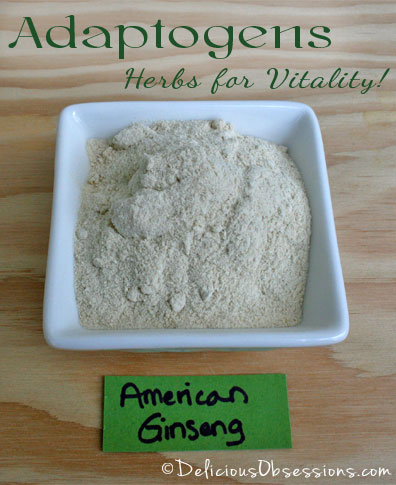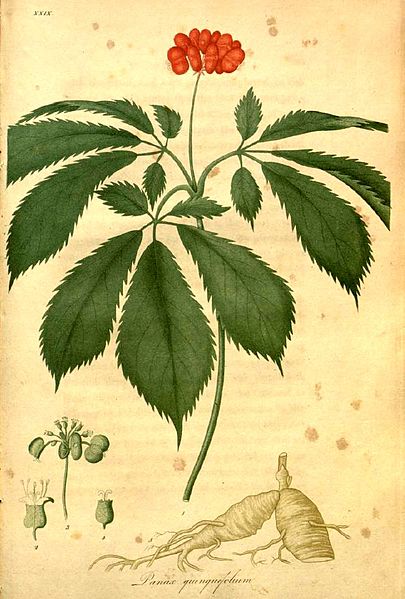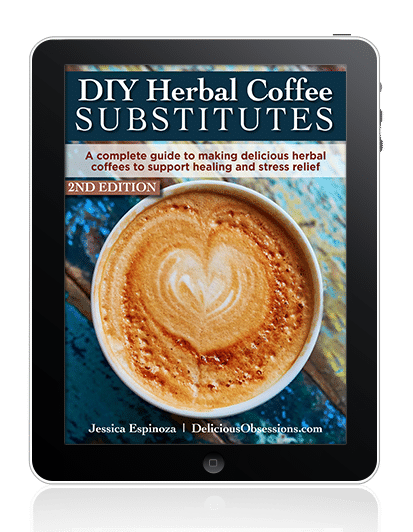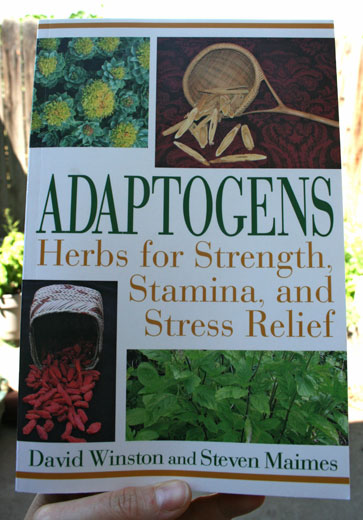FTC Disclosure: Delicious Obsessions may receive comissions from purchases made through links in this article. As an Amazon Associate I earn from qualifying purchases.Read our full terms and conditions here.
Featured Image Above courtesy of Wikimedia Commons
Welcome to the second installment of my multi-part series, where I will be discussing adaptogens and how I am personally using them on my healing journey. In August, 2012, I started on a journey to better health. I decided that it was time that I put my health on the front burner, because we only have one life, and we should all strive to live it the very best we can. I have been chronicling my journey to health and you can read all of those posts here.
For an overview of what adaptogens are, please read the first post in this series: “Adaptogens: Herbs for Vitality (an overview)“. You can also check out the review that I did on the book, “Adaptogens: Herbs for Strength, Stamina, and Stress Relief“, which has been an indispensable resource for me.
Herbs have played a forefront role in my journey so far. There is a whole world of herbs out there that I never knew about until I started on this journey and adaptogens are a subset of herbs that I’d never heard of before last year. While I have used some of the more common herbs, like echinacea for example, I never really branched out or did much research on herbs other than that. While I have really enjoyed doing my own research and speaking to friends about herbs, I know that there is also a lot of value in working with a trained herbalist, especially when you may be facing some serious health problems. Trained herbalists bring a lot of experience and insight from their practice that we do not otherwise have access to and they can be a great addition to your healing team. It’s important to keep in mind a couple of things:
- Many herbs work synergistically with other herbs. I am going to be focusing on individual herbs in this series, but I really am going to be skimming the very top of the subject, so I encourage you to do your own research and work with an herbalist or other holistic practitioner in your own journey. That said, there is also value in the practice of “simpling”, where you focus on using just one single herb. According to herbalist, Brigitte Mars, the art of simpling allows you to use a mild herb over an extended period of time, which is a great way to “deeply connect with all the aspects of a plant’s power and to learn more about the unique flavor and properties of that individual plant.”(4) I personally prefer simpling as a starting point, because I want to know if I have any reaction to a specific herb, before I move forward and start making teas, tinctures, etc., with that herb.
- Not all herbs are suitable for all people. The herbs that I am discussing in this series all fall into the “generally regarded as safe” category, but that does not mean they are safe for everyone. It’s always best to check with your doctor, naturopath, etc., before introducing new things into your diet or supplementation regimen. If you are pregnant or lactating, you should always consult with your physician before using any herb.
DISCLAIMER: Due to the FDA and FTC laws on health claims, I need to make this very clear. None of the information in this post is to be construed as medical advice. I am not a doctor or certified medical practitioner of any sort. I am simply sharing my own personal experiences, as I travel the long road to optimal health. Statements/products discussed have not been evaluated by the Food and Drug Administration (FDA) and are not intended to diagnose, cure, treat, or prevent any disease or illness. Every person is different and you should always consult your own certified health care practitioner before making changes to your current diet or before beginning any herbal or vitamin supplement regimen or exercise program.
American Ginseng (Panax quinquefolius)
I have long been afraid of ginseng, after a bad experience with a ginseng blend that an acupuncturist started me on several years ago. I had an immediate reaction to it when I took it — heart palpitations and anxiety. I stopped taking it, but became very afraid of anything called ginseng from that point on. Turns out, it was an Asian ginseng herbal blend and many people find that Asian ginseng is far too stimulating. When I started researching American ginseng, I was a bit wary, but was happy to discover that American ginseng is typically not as stimulating as Asian ginseng and those who may experience issues with Asian ginseng typically do not have any issues with American ginseng. Also, Asian Ginseng has warming properties, whereas American ginseng has cooling properties, which can explain why it is easier for some to tolerate. (2)
American Ginseng is native to the Eastern U.S. and Canada. It has very specific needs in regards to growing, including rich soil with a high humus content and full shade. It is going to be one of the more expensive herbs out there, as it takes a full seven years to grow a mature root from the time of germination. It is also on the endangered list, which makes it even more of a scare commodity. When it was first discovered in America, it was big business. Did you know that Daniel Boone made a fortune selling wild harvested ginseng? (2)
The root is the most common part of the plant that is uses, with the leaves being used less frequently. Its taste/energy is sweet, bitter, slightly cool, and moist.(1) To me, the taste is not very pleasant. It is strongly bitter on my taste buds and has a “medicinal” taste. Everyone’s taste buds are different, so this may vary from person to person, but it is definitely not one that I would consider pleasant on its own.
David Winston and Steven Maimes, who wrote a fantastic book on adaptogens, called “Adaptogens: Herbs for Strength, Stamina, and Stress Relief“, (read my review of this book here) consider it one of the safer adaptogens in that it is rare that regular use will cause side effects.(1) Modern research has found that American Ginseng may help with the following:
- Support the HPA- (hypothalamus-pituitary-adrenal) axis and adrenal glands
- Regulate immune function
- Support and regulate metabolic syndrome
- Increase energy
- Improve oxygen utilization in the body
- Improve stamina
- Balance hormone levels
- Balance blood sugar levels
- Improve male fertility
- Enhance digestion and absorption of nutrients
- Regulate an overly stressed nervous system
- Improve insomnia associated with chronic fatigue and adrenal issues
How is American Ginseng Used?
 American Ginseng Powder
American Ginseng Powder
David Winston states that his uncle, who was Cherokee, would almost always add a pinch of American Ginseng to any herbal formula that he was making for patients. When David asked why, he said that the ginseng just “made everything work better“.(1) Herbalist, Christopher Hobbs, says that American Ginseng is at the top of his short list of all-time favorite herbs, and not only has he seen many amazing effect from it personally, he also uses it in his practice and sees many positive effects based on his patients use. (1)
The most common ways to use American Ginseng are:
- Tinctures
- Decoctions
- Capsules
There are typically no safety issues with this herb, but there was one clinical trial that showed that high doses of American Ginseng altered the effects of the prescription drug, warfarin, in some patients.(1)
The reason that I chose to experiment with this herb is because of the energy, blood sugar, and hormone balancing effects. I have been using American Ginseng in some herbal blend supplements and sometimes in teas. I find that teas are often the best way for me to get my herbs in, because I drink herbal tea every day, but when it comes to flavor, American Ginseng is not the most pleasant tasting herb. Even using a small amount in a tea can leave the tea tasting bitter and medicinal. Tinctures are probably the best way to incorporate this herb, at least for me personally.
I am pleased that I did not have any of the reactions to the American Ginseng that I did with the Asian Ginseng and I have noticed a bit more energy since starting to use it. Most people will probably notice something when using American ginseng. This is one herb that I think should be tried alone first to see how your body reacts.
Supporting a Your Stress Response, Adrenals, Thyroid, and Whole Body Through Herbs
When it comes to supporting overall wellness, herbs are a great tool to have in your toolkit, especially those who may be dealing with chronic illness of some type. Since 2009, when I started this site, I have met thousands upon thousands of people through my work and by far, the #1 health complaints are:
- adrenal fatigue (or adrenal dysfunction of some sort) (click here to read all of my adrenal health articles)
- thyroid disorders (hypo-, hyper-, or autoimmune) (click here to read all of my thyroid health articles)
Because of this, I wanted to add in a section into this post about the benefit of using herbs with chronic illness. Adaptogens are by far one of the most used herbs when it comes to working with people who have low energy, fatigue, and overall imbalance in the endocrine system (thyroid, adrenals, and blood sugar).
While the benefits of adaptogenic herbs extend far beyond just supporting that one system, this tends to be one of the main reasons people turn to adaptogenic herbs in the first place. That said there are a lot of other herbs out there that offer amazing support for the body, especially those dealing with chronic illness which is why I wanted to share this section today.
If you are dealing with any type of chronic illness, I’m sorry to break it to you, but caffeine may not be your best friend. 🙁 While you can find lots of info online in both the pro- and the anti-coffee camps, the fact of the matter comes down to the fact that are a lot of people dealing with chronic illness, especially thyroid and adrenal problems, that simply cannot tolerate coffee and caffeine.
While those with sluggish adrenal glands tend to feel run down and in need of a regular pick-me-up (like coffee and other caffeinated beverages), in the long run, caffeine can do more harm than good while you are healing. I go into the “whys” around caffeine and your adrenals in this detailed post here. In addition to the caffeine, there are other constituents, molds, and mycotoxins that can show up in coffee that some people find they react to and can further exacerbate the toxic load on the body.
When I was diagnosed with autoimmune disease and adrenal fatigue, one of the first things that had to go was coffee. In addition to dealing with these issues, we suspected that I was having some detox pathway sluggishness so we wanted to also focus on supporting the liver and lymph systems. Most people who are dealing with chronic illness are also going to have issues with detoxification of the body, which is why herbs can play such an important role.
To be honest, I never drank coffee because of the caffeine. I drank coffee for the taste and aroma, as well as the emotional experience I felt to my morning cup of joe. For me, it was a ritual that I looked forward to every day (and sometimes multiple times a day). Whether I was brewing it at home or going to my local coffee shops, the experience was one that I clung to tightly.
But, when I was faced with new health struggles, I knew I had to do whatever I could to support my body and give it the tools it needed to heal. Giving up coffee and caffeine was one step in this direction.
And it sucked.
I turned to the coffee substitutes on the market in a desperate attempt to recreate the ritual I had grown so fond of, but nothing ever tasted the way I wanted it to. Nothing ever gave me that same experience that my cup of “real” coffee did. I knew there had to be something better, but I simply could not find it on my health food store’s shelves.
Necessity is the mother of invention so that is why I created my own coffee substitutes. They were made with organic, sustainably harvested herbs with zero grains, zero gluten, and zero caffeine. Just herbs.
Herbs that not only tasted delicious but supported my body’s function, like liver detox, bile production, digestion, etc. All of the herbs used in my “coffee” blends have been used for thousands of years to support the body’s normal functions and help everything work a little better — something we all need in today’s toxic world! (psst, dandelion is one of the herbs!)
When it came to creating these blends, if I could get something to not only tasted amazing (and helped me recreate my dearly loved ritual), but also did amazingly supportive things for my body, then it’s a no brainer!
I sold these pre-made blends on Etsy for awhile and the demand was more than I could keep up with. People literally LOVED these blends and were stunned at how much like coffee they actually tasted. Customers who had been dealing with a variety of chronic illnesses had given up coffee to heal their bodies, but like me were deeply missing their morning cup of joe ritual.
After careful consideration and work with some highly experienced advisors, I decided to stop selling the pre-made blends and instead share my proprietary recipes in the form of an eBook. That way I could arm people with the knowledge and recipes they needed to make their own caffeine-free, gluten-free, grain-free blends in the comfort of their own home.
That is why I created the best-selling DIY Herbal Coffees eBook: A Complete Guide To Making Delicious Herbal Coffees to Support Healing & Stress Relief.
Now in its second edition, this ebook features:
- All of my proprietary herbal blend recipes to you can craft a homemade herbal cup of “coffee” at home.
- A ton of researched information about coffee’s impact on the health of those dealing with issues like adrenal fatigue, blood sugar dysregulation, autoimmune disease, thyroid disease, and any other chronic illness.
- Information about all of the herbs used, why I selected them, how to source them, how to prepare and store you “coffees”, and much more.
- Access to your own personal coffee shop where I show you how to recreate your favorite coffee shop drinks and pastries with wholesome, nourishing real food ingredients. No junk here. Only real food.
This book truly is a comprehensive guide to supporting your health, reducing your stress, and bringing a little something special back into your healing journey. You can learn more and download your own copy of this revolutionary wellness guide here, or simply click on the image below.
Further Reading
If you are looking for more info on adaptogenic herbs, I HIGHLY recommend this book, Adaptogens: Herbs for Strength, Stamina, and Stress Relief. It is one of my all-time favorite herb books and probably the one I reference the most. Find it on Amazon here.
Basic Herbal Preparations
If you’re new to herbs and are feeling confused about all the different preparations for them, don’t be! Let me help you out with this Basic Herbal Preparations post. You can also watch the videos below to learn more about a couple herbal preparations and about my favorite source for organic, sustainably harvested herbs.
Ready to Learn More?
Now that we have kicked off this series with a feature on American Ginseng, stay tuned for more herbal profiles. I will be writing about the specific adaptogens that I am using in my healing journey. There are a lot of adaptogens out there, but the key is finding ones that work well for your needs. If you like what you’ve read here, please keep in touch! You can subscribe to my semi-monthly newsletter or subscribe to email updates so you never miss a new post. You can also find me on Facebook, Twitter, Pinterest, and Google+. Have a question? Contact me here.
If you’re interested in learning more about herbs and would like to know who I recommend, check out my Resources page.
References
1. “Adaptogens Herbs for Strength, Stamina and Stress Relief”. David Winston and Steven Maimes. Healing Arts Press, 2007.
2. “Ginseng Root and Powder Profile“. Mountain Rose Herbs.
3. “American Ginseng: Male Fertility Tonic“. Natural Fertility Info.
4. “The Desktop Guide to Herbal Medicine: The Ultimate Multidisciplinary Reference to the Amazing Realm of Healing Plants, in a Quick-study, One-stop Guide”, by Brigitte Mars. Basic Health Publications, 2007.





2 Comments